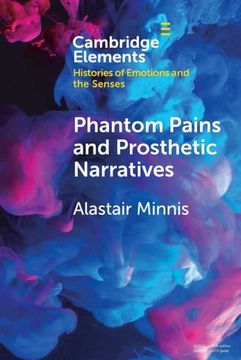Compartir
Phantom Pains and Prosthetic Narratives: From George Dedlow to Dante (Elements in Histories of Emotions and the Senses) (en Inglés)
Alastair Minnis
(Autor)
·
Cambridge University Press
· Tapa Blanda
Phantom Pains and Prosthetic Narratives: From George Dedlow to Dante (Elements in Histories of Emotions and the Senses) (en Inglés) - Minnis, Alastair
$ 66.703
$ 70.213
Ahorras: $ 3.511
Elige la lista en la que quieres agregar tu producto o crea una nueva lista
✓ Producto agregado correctamente a la lista de deseos.
Ir a Mis Listas
Origen: Estados Unidos
(Costos de importación incluídos en el precio)
Se enviará desde nuestra bodega entre el
Jueves 04 de Julio y el
Jueves 18 de Julio.
Lo recibirás en cualquier lugar de Argentina entre 1 y 3 días hábiles luego del envío.
Reseña del libro "Phantom Pains and Prosthetic Narratives: From George Dedlow to Dante (Elements in Histories of Emotions and the Senses) (en Inglés)"
'Phantom limb pain' designates the sensations which seem to emanate from limbs that in reality are missing. The phrase was coined by the American Civil War surgeon, Weir Mitchell, in reference to his fictional amputee, George Dedlow. Contemporary neuroscience holds that the brain encloses a schema which covers the whole body, and asserts its unity even if certain parts are missing. Reading backwards from Dedlow's sufferings, Alastair Minnis traces the medieval precedents and parallels, focusing on Augustine and Dante, who subscribed to the notion of a 'body in the soul'. Dante's souls in purgatory self-prosthesize with aerial phantoms as they long for the full embodiment which only the resurrection can bring. Is a complete body necessary for personhood? And how can the gamut of human feelings be run if parts or the entirety of one's body does not exist? Combining medieval studies and contemporary neuroscience, this absorbing study explores the fascinating and surprising history of phantom pain.
- 0% (0)
- 0% (0)
- 0% (0)
- 0% (0)
- 0% (0)
Todos los libros de nuestro catálogo son Originales.
El libro está escrito en Inglés.
La encuadernación de esta edición es Tapa Blanda.
✓ Producto agregado correctamente al carro, Ir a Pagar.

